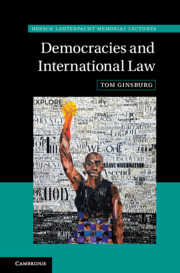Book contents
- Democracies and International Law
- Recent books in the Hersch Lauterpacht Memorial Lecture Series
- Democracies and International Law
- Copyright page
- Dedication
- Frontispiece
- Contents
- Figures
- Tables
- Preface
- Acknowledgments
- Introduction
- 1 Why Would Democracies Be Different?
- 2 Are Democracies Different?
- 3 Can International Law Save Democracy?
- 4 Regions and the Defense of Democracy
- 5 Authoritarian International Law
- 6 Whence the Liberal Order?
- Conclusion
- Index
5 - Authoritarian International Law
Published online by Cambridge University Press: 09 September 2021
- Democracies and International Law
- Recent books in the Hersch Lauterpacht Memorial Lecture Series
- Democracies and International Law
- Copyright page
- Dedication
- Frontispiece
- Contents
- Figures
- Tables
- Preface
- Acknowledgments
- Introduction
- 1 Why Would Democracies Be Different?
- 2 Are Democracies Different?
- 3 Can International Law Save Democracy?
- 4 Regions and the Defense of Democracy
- 5 Authoritarian International Law
- 6 Whence the Liberal Order?
- Conclusion
- Index
Summary
Authoritarian states have used international law in many ways, but generally have mimicked democracies in the postwar period. Authoritarians are now beginning to introduce normative content into the international legal arena. As compared to prodemocratic international law, authoritarian use of international law places greater emphasis on internal security and has a different style, being more flexible and less amenable to third-party dispute resolution. As authoritarian governments become more powerful in the international system, their contribution to international law is growing, potentially diluting the role of democracies.
- Type
- Chapter
- Information
- Democracies and International Law , pp. 186 - 236Publisher: Cambridge University PressPrint publication year: 2021
- 2
- Cited by

